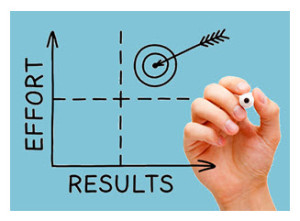What’s more important — effort or results?
 No, this isn’t about my (stalled) Non-Diet Diet, though it could be. It isn’t about my (foolish?) insistence on 14-hour workdays, though it could be. It is a question we ask ourselves — or should — when we consider what we value and what we praise in a variety of contexts.
No, this isn’t about my (stalled) Non-Diet Diet, though it could be. It isn’t about my (foolish?) insistence on 14-hour workdays, though it could be. It is a question we ask ourselves — or should — when we consider what we value and what we praise in a variety of contexts.
If my living depends on sales skills, and despite my best efforts I can’t close a deal, do my efforts matter?
Certainly not if I want to keep my job, and likewise if I’m compensated largely or entirely on commission.
Then again, less extreme scenarios may incline us to feel good about our efforts regardless of outcome.
“I Tried. Doesn’t That Count?”
Let’s consider a more personal subject. What if I’m doing my level best to negotiate a compromise with the person in my life over schedules or money? If progress is made, even if short of the goal, then efforts are a significant factor in perceiving — and being perceived — as being invested in the both the process and the result.
In a relationship, you might say that efforts go far in giving the appearance of being supportive, and indeed, in being supportive. After all, when we see someone trying, we feel like we’re “in it” together.
Trying, in this example, is itself a result.
That said, if all you see are “efforts” and no dénouement at the end of a year, you might want to reconsider.
Rewarding Effort vs. Results
What about rewarding effort versus results? Isn’t this precisely what we do in American culture when it comes to how we raise our children? Don’t we heap lavish praise, whatever the result? Shouldn’t we moderate our Esteem Encouragement Policy depending on the age, personality, situation and stakes involved?
 If my child has struggled with math for years and I plainly see that he is putting in the hours to improve and still not getting it, should I nonetheless reward the effort in some way so he won’t be discouraged? (And of course, we would need to rethink our approach so we could make progress.)
If my child has struggled with math for years and I plainly see that he is putting in the hours to improve and still not getting it, should I nonetheless reward the effort in some way so he won’t be discouraged? (And of course, we would need to rethink our approach so we could make progress.)
But that notion of a prize for every participant? Don’t we need a reality check?
Professional situations are also cause for reflection. Most adults would agree that generally results trump efforts. I may be appreciated for trying hard or even trying brilliantly, ideas and outputs are extremely important to reaching our objectives, but the bottom line is the outcome.
When Recognition of Efforts = Motivation
Returning to the personal for a moment, if I’m trying to change a habit, it behooves me to give myself a little credit for diligence even if I don’t meet my goal. Again, I try to stay positive in acknowledging progress. Without giving myself that credit, I may lose motivation. Yes, it’s treating myself as I might a child, with a sort of “don’t lose heart, you’ll get there, keep trying, you did great trying so hard” message.
That consolation is usually short-lived; I’m irritated when I don’t see progress or I don’t taste success.
However, in this example, recognition of effort = motivation.
This is the reason, along with reinforcing self-esteem, that it makes sense to reward a child’s efforts — but, in my opinion, with equal parts reality and focus on the goal. Or, adjust the goal if necessary. And all of that, as I already mentioned, in age-appropriate and situation-appropriate ways.
But what happens when we see tremendous efforts that come to nothing? Don’t we all face this? Wouldn’t we feel lousy if we didn’t tell ourselves that efforts matter — or if someone we knew praised our trying? What if focus on the fact that trying often merits praising? We pick up new skills, new resolve, new self-confidence.
Helping Hand FAIL
 Recently I was trying to assist a friend. I pulled out all the stops brainstorming and making connections in order to facilitate some job opportunities. This took place over the course of a couple of weeks — 15 minutes here, 20 minutes there. Exactly the sort of thing that other people have done for me, and for which I’m most grateful.
Recently I was trying to assist a friend. I pulled out all the stops brainstorming and making connections in order to facilitate some job opportunities. This took place over the course of a couple of weeks — 15 minutes here, 20 minutes there. Exactly the sort of thing that other people have done for me, and for which I’m most grateful.
Unfortunately none of it panned out.
The friend was disappointed of course, said thank you, and that was that. I felt as if I had let her down. I know how much she needed work. I know how much she hoped I could kick-start something.
And I find myself wondering: Does this effort count if I didn’t get results?
I didn’t learn anything from it, except perhaps that the job market still remains extremely challenging, especially for anyone in the 50+ bracket. And while I know we all like to lean toward a positive spin, there is no positive in this for me — only disappointment for both of us.
Sure, we never know what seeds might be planted that would sprout something useful for her in the future. That’s what I tell myself anyway.
Trying Is Trying; Accomplishing Is Great
So here’s where I am: Trying can be very trying when you feel that you’re getting nowhere. Even more so when despite your best efforts, you don’t meet your goal — from selling (which your mortgage may depend on) to losing weight (which your self-esteem may depend on) to that compromise between spouses (which your relationship may depend on).
And achieving your goal — especially if it’s important — feels pretty great.
I’m curious what your impressions are on this subject, for both adults and children.
- Is the prevailing measure of success almost always results over effort?
- Where do you place the importance of good intentions in this equation?
- At what point do you start paying attention to overdoing the reward-for-effort scheme when dealing with children?
You May Also Enjoy
Efforts do matter if they do move you toward the desired result. Baby steps are fine, but no one should feel that Sysiphus’ efforts are required to move forward. I have come to this conclusion very late in my life, indeed.
I think you nailed it Cornelia. The drama is when we feel like we’ve become Sisyphus.
This subject really interests to me. At 50+ a couple of years ago I went to graduate school at night while working full-time determined to make a career change to social work. Soon after I got my degree, the job hunt started. To make a long story short, I was not successful in getting a social work job. I was devastated that my efforts did not pay off because I expected to be able to get a job – that was my pay off, not the degree. Almost a year has past since that experience. I’ve settled into a job that I’ll stay with until I can retire. I’m slowly beginning to see the degree as the pay off and feel proud of the achievement. I do hope that my future after retiring will be more fulfilling than my work experience as been.
So glad you stopped by to read and comment, Jane. You raise very interesting complementary topics — the extent to which we should view education as a means to an end, an end itself, an experience to be appreciated — or all of the above. So much is about our expectations, isn’t it. Pragmatism comes in, too — especially when we’re at midlife, needing to earn a living, and looking at opportunities not only for now but moving into the future.
And I’m glad to hear you’re proud of that achievement! Grad school while working full-time? That isn’t for the faint of heart.
This is such a great topic! One, I’m sure, we have all faced. Of course, the effort is critical, because without it there can be no reward. I’m a results driven person, so, when I have put forth a tremendous effort and don’t see results, it’s time for me to reevaluate the effort…change, hone, scrap it all…depends. In one of my lives, I had a fine art gallery…and a lot of effort went into making it successful to the point where I could generate a profit. A close friend of mine would always ask, “Are you busy?” I would respond, “Yes, very!” He would counter with “Are you good busy or bad busy?” Finally, in an effort to end this conversation, I would always say, “You can’t have one without the other.” Of course, I understood the meaning of his questioning, he wanted to know if my efforts were being met with success. I believe it is critically important to reassess, and not wait a year to do it. Success takes time, however, most of us can judge when continued efforts will be fruitful, or require a different direction.
As far as rewarding children for effort alone, or simply just “showing up” is not as productive as one would hope. Every child, successful or not, knows when a reward should be bestowed. In yet another life, I taught at an urban high school for 18 years. Every year we had a fashion show attached to crowning a “homecoming” queen. There would often be as many as ten contestants for the title of “homecoming queen”, yet, to assuage the egos of those not successful, the administration gave crowns to all of the contestants, just a bigger one to the elected “queen”. Not only did the losers know this was a meaningless farce, but this practice left the “queen” uninspired! Efforts should be verbally recognized and acknowledged, but rewards are for achievements.
Such great input, Angela. The “good busy / bad busy” distinction is an interesting one.
Wonderful point on the fact that children sense / know when they really deserve a reward and when it is a hollow gesture. In fact, most adults I know feel lousy if they’re given praise for something they consider second-rate.
So glad you stopped by!
After getting my real estate license a year ago, I knew it was competitive to get clients but didn’t realize how incredibly challenging it is without a decent-sized marketing/internet budget and lacking relatives/friends who will hire me despite not having years of experience yet.
Nevertheless, I am determined to go forward with working as a transaction coordinator at our real estate office while trying various ways to get clients- since commissions is where the REAL $$$ resides!
As far as trying to help your friend went … and by extension, a family member …. it seems to me that if the trying to help is framed as just that, so there are no false expectations or promises, it is very important and definitely counts. Without it, the person could easily feel alone, then isolated, without recourse, …who knows what kind of negative thing. With the effort of support from friends or family, community is built, and even without the result of a job, the experience would have been more negative. So though the success wasn’t a job, there was a different kind of success there.
What a wonderful perspective, Suze. Thank you.
What a great topic! I think it’s true that the prevailing measure of success in this culture is almost always results over effort, especially if we’re talking about external evaluations. (Of course, this can ultimately affect how one evaluates her/himself.) Earlier in my life, for better or worse, I was more process-oriented – I needed to be able to appreciate the process of getting or achieving a thing. I’ve come to appreciate, thankfully, the value of results, but I still need to feel good about the process and what I did to get there.
So a lot of what matters is whether we’re talking about internal or external evaluators. As I think Angela indicated that folks know when it’s hollow. They might not know it while they’re working toward the goal, but perhaps after they complete it. As a child, it was decided I was “gifted.” What that meant, in my case, was that I knew how to pass tests. I was probably advanced for my age. But I didn’t really know how to learn – as long as things came easily to me, I was able to keep passing tests and “achieving” but more and more I felt like a fraud.
All that to say, I think focusing on awards is missing the point. I mean, it’s what we do as a society, but what’s really in the best interests of children and adults is that we’re able to figure out the goals that matter to us, go for them and LEARN along the way of trying to achieve them. For example, I think “Helping Hand FAIL” is a harsh view of what you did. You said you were trying to assist a friend – you actually succeeded at assisting your friend. I think your goal really was to help your friend. (I don’t know you, but I don’t think you have a bag of jobs in your basement and decided you didn’t want to share one.) There’s only so much we can do. Being realistic about the goals we set for ourselves is imperative.
What a great comment, Kelly. So much here to think about, thank you.
All good points. Perhaps I’m hard on myself because I’ve been there on the other side of this issue. It’s a frightening place to be.
Yes, it can be hard to help and appreciate the limits of one’s ability to help. But I think it’s truly wonderful that you did!
Yes, it’s right that ALWAYS EFFORT MATTERS, NOT RESULT. It’s like traffic rules. If one person follows and another person doesn’t – an accident may happen. The person who is following may get harmed – but that doesn’t mean we shouldn’t follow traffic rules. When a person is putting in sincere effort, but not getting desired result – it’s unfortunate that there is nobody to care about the efforts. But always efforts should be taken care of.
I’m very conflicted about this.
In school, I tended to either do very well with little effort, or toil endlessly for dismal results. I learned to only value meeting others’ expectations, regardless of my own feelings or interests. That allowed me to crank through college & graduate early, and survive over 20 years in the public sector. But my life has been a waste; endlessly twisting mysef to do whatever it took to meet other’ expectations. I feel no pride or satisfaction in life, only relief when I’ve met someone else’s target. Now unemployed, I feel no desire or interest to rejoin the world of ‘success’. That word means nothing to me.